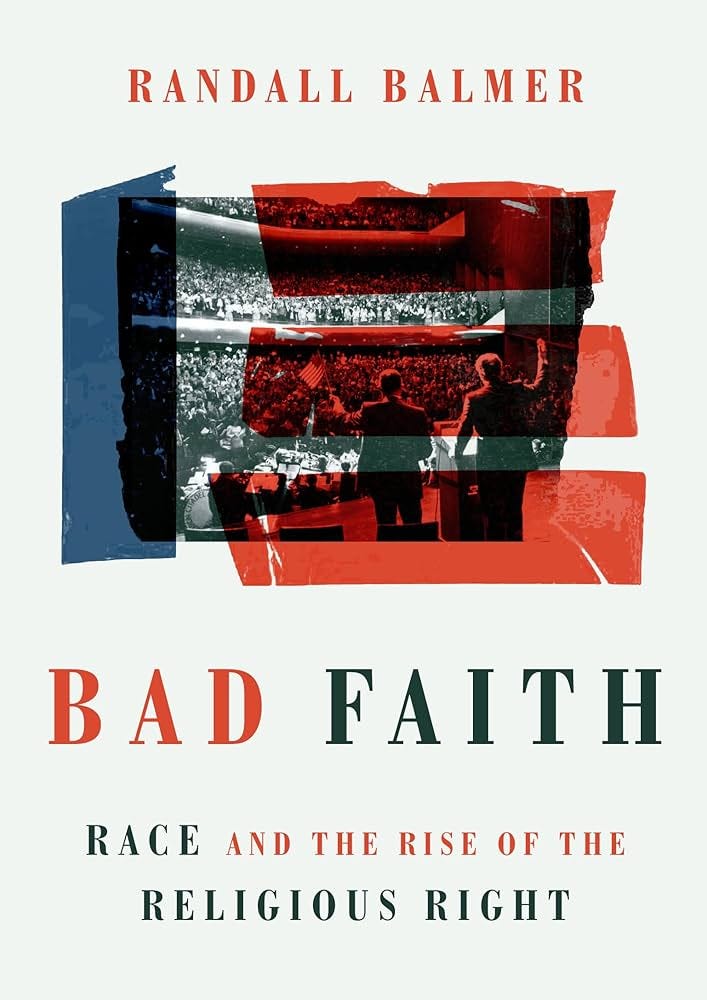“The abortion myth matters because unacknowledged and unaddressed racism has a tendency to fester.”
Here is a recent conversation with Dr. Randall Balmer, a professor at Dartmouth, about his recent book, Bad Faith: Race and the Rise of the Religious Right.
About the book:
There is a commonly accepted story about the rise of the Religious Right in the United States. It goes like this: with righteous fury, American evangelicals entered the political arena as a unified front to fight the legality of abortion after the Supreme Court’s 1973 Roe v. Wade decision.
The problem is this story simply isn’t true.
Largely ambivalent about abortion until the late 1970s, evangelical leaders were first mobilized not by Roe v. Wade but by Green v. Connally, a lesser-known court decision in 1971 that threatened the tax-exempt status of racially discriminatory institutions—of which there were several in the world of Christian education at the time. When the most notorious of these schools, Bob Jones University, had its tax-exempt status revoked in 1976, evangelicalism was galvanized as a political force and brought into the fold of the Republican Party. Only later, when a more palatable issue was needed to cover for what was becoming an increasingly unpopular position following the civil rights era, was the moral crusade against abortion made the central issue of the movement now known as the Religious Right.
In this greatly expanded argument from his 2014 Politico article “The Real Origins of the Religious Right,” Randall Balmer guides the reader along the convoluted historical trajectory that began with American evangelicalism as a progressive force opposed to slavery, then later an isolated apolitical movement in the mid-twentieth century, all the way through the 2016 election in which 81 percent of white evangelicals coalesced around Donald Trump for president. The pivotal point, Balmer shows, was the period in the late 1970s when American evangelicals turned against Jimmy Carter—despite his being one of their own, a professed “born-again” Christian—in favor of the Republican Party, which found it could win their loyalty through the espousal of a single issue. With the implications of this alliance still unfolding, Balmer’s account uncovers the roots of evangelical watchwords like “religious freedom” and “family values” while getting to the truth of how this movement began—explaining, in part, what it has become.
Show Notes
Summary
The conversation explores the origins and impact of the religious right in American politics, particularly within evangelical Christianity. It discusses the role of women in the pulpit, the undercurrent of race in evangelicalism, and the connection between evangelicalism and the Republican Party. The conversation also delves into the history of the religious right, including its roots in racism and its support for Donald Trump. The importance of accurately telling our history and addressing racism is emphasized. The conversation explores the persistence of racism within the Southern Baptist Convention and the religious right, as well as the role of race in their current political strategy. It also touches on the cultural changes happening in the Catholic world. The guests discuss the ways in which racism is often unacknowledged or denied, and how it manifests in society. They emphasize the importance of repentance and hope in addressing racism. The conversation concludes with a discussion on the academic environment and the inclusion of people of faith.
Takeaways
The religious right in American politics has its roots in racism and a defense of racial segregation in evangelical institutions.
The support for Donald Trump within the evangelical community is not primarily driven by issues like abortion, but rather by a history of racial bias and a desire to maintain political power.
The connection between evangelicalism and the Republican Party has led to a blurring of the lines between politics and religion, with evangelicalism becoming more of a political marker than a religious one.
Accurately telling our history and addressing racism is crucial in order to prevent it from festering and perpetuating harmful ideologies and policies.
Younger evangelicals are increasingly disillusioned with the movement due to the hypocrisy they see in the alignment of evangelical leaders with morally questionable political figures. The Southern Baptist Convention has a history rooted in racism, and unexamined racism continues to be present within the denomination.
The religious right, including the Southern Baptist Convention, has shown support for Donald Trump despite his controversial statements and policies, particularly regarding race and immigration.
Race plays a role in the current political strategy and engagement of the religious right and evangelical movement.
Examining and acknowledging personal biases and reactions to people of color is important in combating racism.
Hope and repentance are essential in addressing racism and working towards a more inclusive society.
Academic environments should strive for inclusiveness and recognize the value of people of faith.
Sound Bites
"Women are being made the scapegoats for what's happening in Mainland Protestantism."
"Something's going on here and we need to account for race when we think about evangelical political activity over the last half century."
"Abortion was not the catalyst for the emergence of the religious right in the 1970s."
"Can you go from 1980 to talk a little bit about the ways that this unexamined racism continues to rear its head in the Southern Baptist Convention?"
"Is race a currently now, you know, going back, knowing its origins now within the religious right and evangelical movement, how does race play out then in their current political strategy and engagement?"
"It's cues from the Bible. lot of evangelicals claim to be biblical literalists. Well, what does the Bible say about welcoming the stranger or treating the foreigner as one of your own?"















Share this post